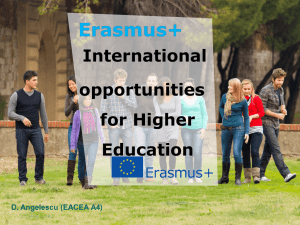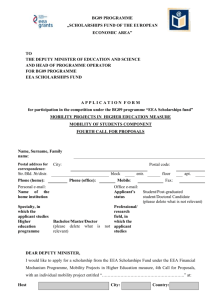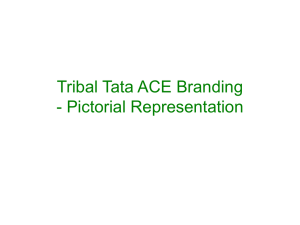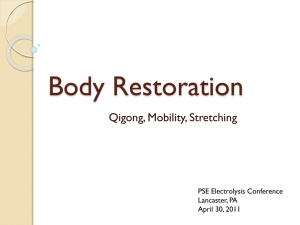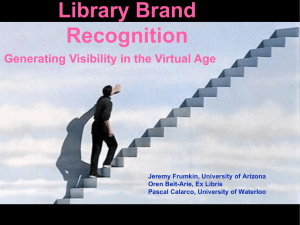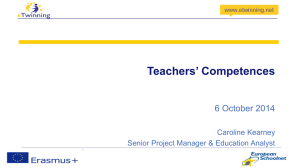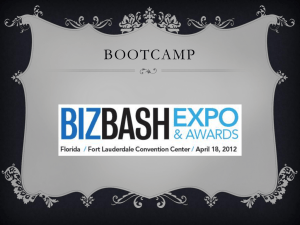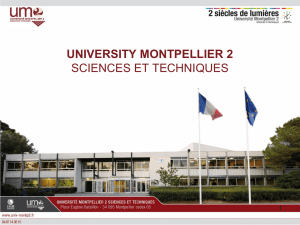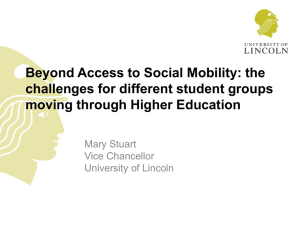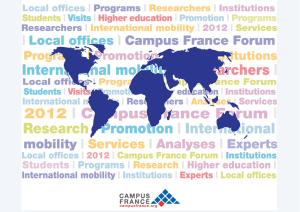5 steps towards personal branding
advertisement
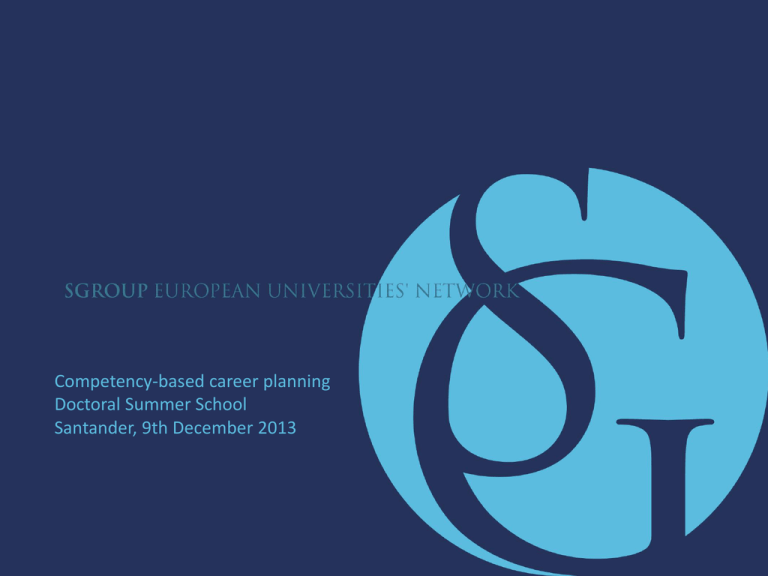
Competency-based career planning Doctoral Summer School Santander, 9th December 2013 What we do • Setting up consortia for EUfunded projects in joint pogrammes, research, and mobility • Privileged contacts to university associations and HEIs worldwide • Collaboration with USA, Latin America, China, and Eastern Partnership • Representing members at international fora and events Intra-European and InterContinental mobility programmes for: • • • • Students Doctoral candidates Postdocs Administrative staff • Reinforcing collaboration in research and innovation I. Internationalisation strategy IV. Academic mobility II. Academic collaboration III. Transfer of knowledge • Strengthening of social mission of universities • Identification and promotion of individual and institutional expertise • Specialised workshops and seminars • Thematic interest groups and task forces Selected Projects and Activities Regional Collaboration & Mobility • • • • Berkeley Exchange Programme – USA Alfa Puentes – Latin America ICon – Intercontinental Academic Mobility Programme STEP Programme – Placements for students Transfer of Knowledge • • • Summer Schools for Doctoral Students Specialised workshops and seminars Thematic Task Forces and interest groups • • • Collaboration with university associations and HEIs with Latin America (AUGM, FAUBAI, ASCUN, OUI) Consortia for global and intra European mobility United Nations’ Academic Impact Project • • • • Networking for EU-funded projects Assistance with internationalisation of Science and Technology Specialised courses and workshops Competence development activities Strategic Alliances Strengthening Research Capacities Manage your competences Definitions Skills Competences A skill is the learned capacity to carry out pre-determined results often with the minimum outlay of time, energy, or both. A cluster of related abilities, commitments, knowledge, and skills that enable a person (or an organization) to act effectively in a job or situation. Skills can often be divided into domaingeneral and domain-specific skills. Competence can occur in any period of a person's life or at any stage of his or her career. Skills typologies Generic skills • Capacity for applying knowledge in practice • Planning and time management • Oral and written communication in your native language • Knowledge of a second language • Elementary computing skills • Research skills • Capacity to learn • Information management skills (ability to retrieve and analyse information from different sources) • Critical and self-critical abilities • Capacity to adapt to new situations • Capacity for generating new ideas (creativity) • Problem solving • Interpersonal skills • Appreciation of diversity and multiculturality • Ability to work autonomously • Initiative and entrepreneurial spirit • Ethical commitment • Concern for quality Transferrable skills • Plan and arrange events and activities • Delegate responsibility • Motivate others • Deal with obstacles and crises • Multi-tasking • Co-ordinate fundraising activities • Coaching • Research • Manage finances • Work in a foreign language • Manage ethical issues • Understanding of cultures and customs of other countries Knowledge Competence Skill Attitude Challenges of K-based Economy Resources in Knowledge-based Economy Resource Hierarchy Model by Javidan 1998 Shifting towards learning organisations From… Towards… •Attitude „knowledge gives power” •Attitude „We value sharing knowledge” •Many levels of management •Few levels of management •Irregular training activities •Continuous education •Power resulting from the position held •Power resulting from being a part of a community of experts •Imbalanced responsibility •Joint responsibility •Culture of blaming others •Culture of responsibility •Culture of rules and principles •Culture of values and people •Organisational silos •Multidisciplinary teams of experts •Avoiding risks •Entrepreneurial spirit •Orientation on organisation •Orientation on customer •Lack of transparent management rules •Full transparency of management •Rational or controlled access to information •Full access to information •Task forces created by management •Communities of practice New category of workers Knowledge Worker •Produce and own intangible assets of organisation (tacit knowledge) •Generate added value for organisations •Many self-employed at SMEs or work as freelancers •More loyal to their professional groups than organisations •Know more about a specific area than their supervisors •Have to process, retain and develop a large amount of knowledge •Able to work independently on complex problems •Refuse following strict or rigid rules or procedures •Motivated by challenges and growth rather than power or money •Mobile •Require other team members to perform their duties (importance of networking, communication skills) •Apt at using information and communication technologies •Expect flexible organisation, task-oriented work, teamwork and democratic styles of management Competence-based HRM Areas Methods •Assessment and selection •Competence frameworks •Performance management •Job profiling •Learning and development •Specific assessment tools •Succession management •Talent management Design your unique career path PhD for Industry or Academia? • Career prospects for doctoral candidates – Research Organisations – SMEs – Large Entreprises – Academia – Research institutes – Self-employment Competence-based approach towards professional career planning Professional Competences http://www.youtube.com/watch?v=0QUyCrf2hiI Create your personal brand 5 STEPS TOWARDS PERSONAL BRANDING 1. 2. 3. 4. 5. ACKNOWLEDGE YOUR UNIQUENESS STAND OUT BE YOUR OWN BOSS FORGET ABOUT A LADDER BUILD YOUR BRAND 5 STEPS TOWARDS PERSONAL BRANDING 1. ACKNOWLEDGE YOUR UNIQUENESS THROUGH EXPANINDG YOU SELF AWARENESS a. Practice feedback analysis b. Use psychometric tests (personality or competence tests) c. Get to know your strengths (Gallup’s Test - The strengths finder 2.0) d. Ask different questions 5 STEPS TOWARDS PERSONAL BRANDING 2. STAND OUT a. b. c. d. e. What are your values? What motivates you? What gives you energy and joy? What do you stand for in your life? How would you like to contribute? 5 STEPS TOWARDS PERSONAL BRANDING 3. BE YOUR OWN BOSS a. b. c. d. Accept yourself as you are Accept responsibility for your own growth Know what you want Control your focus 5 STEPS TOWARDS PERSONAL BRANDING 4. FORGET THE LADDER a. b. c. d. e. Grow from within Follow your true interest and passion Strive for excellence Enjoy the process Get out from your comfort zone 60% of time 40% of time 5 STEPS TOWARDS PERSONAL BRANDING 5. CREATE YOUR OWN BRAND a. Be genuine b. Take a stand – communicate your qualities, values, and goals by action not words c. Create a value of what you do to others – it’s about giving e. Build a network of partners – help others grow too f. Collect testimonials and personal portfolio Identity does not derive from our nationality, position, or a social status. It’s a combination of our strengths, talents, passions, and the purpose that you bring in to your life. Take a next step Answer 3 fundamental questions 1. What do you want to experience in life? Answer 3 fundamental questions 2. How would you like to grow? What would you like to learn? Answer 3 fundamental questions 3. How would you like to contribute? High Cost/effort Eliminate Raise Value > important than effort Reduce Create High Low Value “A winner is a dreamer who never gives up” Nelson Mandela http://www.youtube.com/watch?v=sb2YOg_dkQM Thank you for your attention! Wioletta Węgorowska Executive Director SGROUP European Universities’ Network Rue de Stassart 119 1050 Brussels, Belgium wioletta.wegorowska@sgroup.be www.sgroup.be
